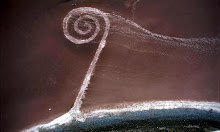
On the topic of the eighteenth century notion that art should have a certain didactic quality to it, versus the twentieth century avant garde idea that art should avoid the moral and the norms that it is so commonly associated with, we look today at some examples in both literature and visual art.
Silliman's "Age of Huts" has provided us with a great deal to look at, but for the sake of length, I will simply summarize. Matthew Arnold's idea of "disinterestedness" is one of enormous proportions; he says that literature is supposed to maintain a disinterested voice, so that the reader can contemplate without being disturbed. That is, the writer should not write in such a way that it disturbs the neutrality of the work, causing an undesired bias/sway in the work itself. In Silliman's poem, we see so much of that "disinterestedness" that is fairly uncommon of so many works. It is a "stream of data" that has literally no bias. It is almost as if he's writing for the sake of writing.
What does all this have to do with situation? Well for starters, it very much is a literary criticism idea that has profound impact in the realms of the situation. By being "interested" or involved and forcing a moral upon the work, it takes the situation away from the reader, in turn giving the reader a linear result. When looking at a "disinterested" work we are able to put ourselves in an ambiguous situation, the result defined clearly by each person's own situation and not by the author's influence.
Another topic we looked at was the idea of anti-didacticism, a focus of the avant garde art of the twentieth century. We look at Duchamp's "The Fountain," an iconic piece of avant garde art, and see a reflection of what we see in Silliman's writing; the emptiness and situation based feeling of interpretation. The question is then worth posing: is there a middle ground? on the scale from didactic to disinterested, can we fall somewhere in between, or do we have to set our feet firmly on the radical ends of the spectrum?
Personally, I hope there's a place for both art that is scholarly and erudite, and work that is free of opinion and allows for complete viewer interpretation. That goes for both art and literature.










No comments:
Post a Comment